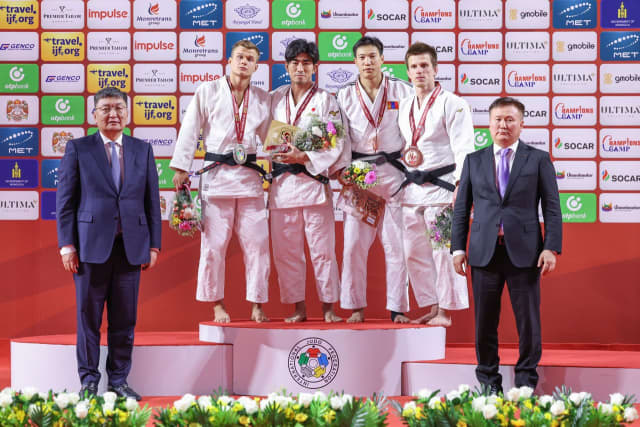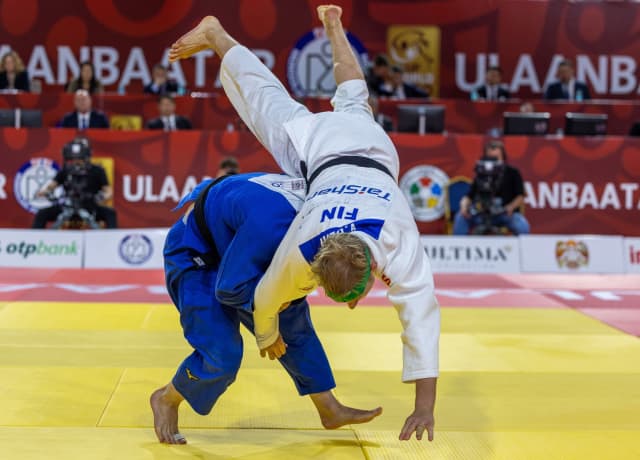In this unpredictable game, it was Danil Lavrentev (AIN) and Ayub Khazhaliev (AIN) who faced off in the semi-finals, the former taking the upper hand to reach the final.
The other semi-final opposed the survivor Behruzi Khojazoda (TJK) and Ken Oyoshi (JPN) but before that, we will remember that during the second round, Khojazoda was opposed to a legend of world judo, the Korean, Lee Won-Hee. Younger people may not remember Lee Won-Hee. To say that he was Olympic champion and world champion already gives an idea of the calibre of this exceptional judoka.
A first gold medal on the WJT for Oyoshi Ken 🇯🇵 🥇#JudoUlaanbaatar #Judo #Ulaanbaatar #Mongolia #Sport #OlympicQualifiers #RoadToParis2024 #WJT #Olympics pic.twitter.com/zOvo43YX0o
— Judo (@Judo) June 24, 2023
A legend returns 🇰🇷🥇 Lee Won Hee, tai-otoshi master!
— Judo (@Judo) June 24, 2023
📺 Watch live on https://t.co/AVIXV0i9lF premium now!#JudoUlaanbaatar #Judo #Ulaanbaatar #Mongolia #Sport #OlympicQualifiers #RoadToParis2024 #WJT #Olympics pic.twitter.com/3u895mpJ9l
To add to that, his Olympic title was won in Athens in 2004, after having been world champion in 2003 in Osaka, twenty years ago, almost last century. Finally, we complete this quick description by specifying that he was born in 1981 and you understand the extraordinary nature of his participation in the Ulaanbaatar Grand Slam 2023. His opponents back then were Vitali Makarov or Daniel Fernandes, judoka who have long been on the coach's chair.
Continuing to train regularly with the Korean men's national team, Lee Won-Hee, aged 41, almost 42, was therefore present at the Steppe Arena this morning. He won his first fight with great tactical mastery, to finally bow out in the second round against the future semi-finalist, Khojazoda. This crossing of generations is both symbolic and beautiful to see. The years have passed but the passion for judo is still there and frankly, we'd all have loved, for the beauty of the sport, to see him take it a step further. Maybe another time because what is certain is that Lee Won-Hee has lost none of his fighting spirit.
In the semi-final Behruzi Khojazoda finally had to bow out to the Japanese who after a tough fight pinned him to the ground with a superb ippon.
The final started with a massive attack from Danil Lavrentev, an attack that against anyone else would have scored, but Ken Oyoshi was well positioned to counter and what an ura-nage it was, with Lavrentev flying through the air. It was ippon and a gold medal for Oyoshi.
The first match for a bronze medal opposed Erdenebayar Batzaya (MGL) and Behruzi Khojazoda (TJK). The pressure was quickly on Khojazoda's shoulders as Batzaya proved to be more active. The Tajik was penalised twice, as the Mongolian judoka had only one shido to his name. With less than a minute to go, Khojazoda engaged a desperate o-soto-gari that was countered by Batzaya for waza-ari. To avoid the fall, Behruzi Khojazoda grabbed his opponent under the belt, which meant a third shido for him and the victory for Erdenebayar Batzaya and the host country.
Valtteri Olin (FIN) and Ayub Khazhaliev (AIN) faced each other for a place on the podium. The two competitors engaged a superb battle, attacks literally raining on the tatami. It was Ayub Khazhaliev who eventually won with a te-waza that was awarded waza-ari.









